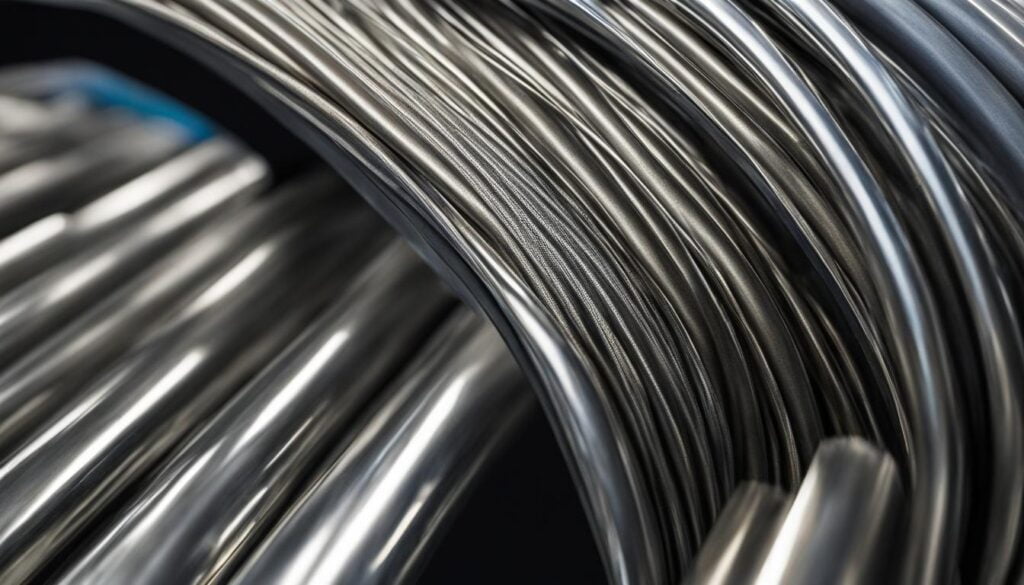The ultimate tensile strength (UTS) is an indispensable material property used in various engineering applications. Measuring a material’s resistance to breaking under tension, UTS greatly influences the performance of components designed to withstand high tensile loads. In this article, we will explore the importance of tensile strength in engineering, its role in material selection, and how companies such as KT-Foundry provide alloy steel castings with enhanced tensile strength. From ductile to brittle materials, understanding the stress-strain relationship and the tensile test process offers valuable insights into engineering strength and material properties.
Key Takeaways
- The ultimate tensile strength measures a material’s resistance to breaking under tension, making it crucial in engineering applications.
- Material properties vary significantly between ductile and brittle materials, influencing their performance under stress.
- Understanding the stress-strain relationship through tensile testing is essential for material selection, design, and quality control in engineering.
- High tensile strength materials, such as alloy steel castings, are widely used in industries like aerospace and construction for their durability and resistance to failure.
- Companies like KT-Foundry are committed to providing materials with superior tensile strength, ensuring enhanced performance and reliability in their products.
Understanding Tensile Strength and its Importance
Tensile strength is a pivotal material property revealed through tensile strength testing. The capacity to resist tension is expressed as stress (force per unit area) and is crucial for materials that must endure stretching or pulling without failure. Ensuring their reliability and durability in practical applications is essential, especially for high-performance uses such as alloy steel castings in industrial engineering.

Yield strength and ductility are two other essential factors derived from the stress-strain curve. Yield strength represents the point at which a material will undergo permanent deformation, while ductility refers to the ability of a material to deform plastically without breaking. Understanding and interpreting the stress-strain curve is crucial in material selection, determining the appropriate engineering stress level for a given application and ensuring optimal performance.
Quality control in engineering is an integral aspect of material selection. The tensile strength testing processes must be thorough, allowing engineers to confidently select materials that will perform as expected under various tensile loads. With proper quality control measures in place, engineers can better ensure the reliability and safety of the components in their high-stress applications.
Tensile strength testing is essential for materials that must endure stretching or pulling without failure, guaranteeing their reliability and durability in practical applications.
- Material Selection: Understanding tensile strength, yield strength, and ductility is critical in selecting the right material for a specific purpose.
- Engineering Stress Level: Determining the appropriate level of stress a material can handle is vital for a component’s performance and longevity.
- Quality Control Measures: Ensuring rigorous testing processes and proper quality control helps engineers select the most suitable materials for each application.
| Material | Tensile Strength | Typical Applications |
|---|---|---|
| Steel | 400-550 MPa | Automotive, construction, and heavy machinery |
| Aluminum | 70-700 MPa | Aerospace, automotive, and packaging |
| Copper | 210-420 MPa | Electrical wiring, pipes, and thermal management |
| Titanium | 240-950 MPa | Aerospace, medical, and chemical processing |
In conclusion, tensile strength is an indispensable aspect of engineering, affecting material selection, engineering stress levels, and quality control measures. It guides engineers in choosing the appropriate materials for various industrial uses based on their tensile properties, ensuring reliable and efficient performance in diverse applications.
The Role of High Tensile Strength in Material Selection
Industries including aerospace and construction rely heavily on materials with high tensile strength to ensure the safety and durability of their products. Alloy steel, for example, is favored for its exceptional ability to withstand high levels of tension without failing, making it ideal for critical components in structures and vehicles. These industries must account for factors such as the potential for high tensile stresses and the presence of flaws or initiation sites when selecting materials, as they directly affect the performance and safety of the final product.
Key Industries Relying on High Tensile Materials
- Aerospace industry – The high-stress applications in aerospace necessitate materials with high tensile strength capable of withstanding extreme forces and temperatures.
- Construction materials – For the structural integrity of buildings and infrastructure, tensile strength is a critical factor to ensure safety and longevity.
- Industrial engineering – In the development of machinery, components must have high tensile strength to endure repetitive stresses and heavy loads.
How KT-Foundry Ensures Superior Tensile Strength in Alloys
At KT-Foundry, we focus on delivering alloy steel castings with superior tensile strength through meticulous quality control and optimization of alloy composition. Our testing processes identify and adjust critical factors like material flaws and tensile stress concentrations, ensuring the delivery of alloy components capable of performing under demanding conditions. By controlling the metallurgical processes, KT-Foundry enhances the tensile properties of alloys used in engineering applications where high strength is non-negotiable.
Comparing Materials: High Tensile Strengths Across Different Substances
| Material | Ultimate Tensile Strength (MPa) |
|---|---|
| Alloy Steel | 758-1450 |
| Carbon Fiber | 1600-4100 |
| Aluminum Alloys | 300-600 |
| Composite Materials | 300-1500 |
| Stainless Steel | 500-1600 |
A comparative assessment of materials based on their tensile strengths is instrumental in material selection. Substances like steel and carbon fiber exhibit high ultimate tensile strengths, making them suitable for use in settings where high tensile load capacity is essential. Tensile strength data from various materials enable engineers to make informed decisions, balancing between strength, ductility, and overall performance for applications ranging from consumer goods to industrial equipment.
Conclusion
Comprehending and applying tensile strength in engineering is essential for the reliability and success of diverse industries. At KT-Foundry, our emphasis on high tensile strength in alloy steel castings exemplifies our dedication to exceptional material performance. By analyzing tensile strengths across various engineering materials, we can inform and refine our design and manufacturing processes, ultimately benefiting the end user through products that meet the highest standards of strength and durability.
Recognizing the benefits of tensile strength, such as its influential role in material selection and engineering decisions, is crucial for developing innovative solutions for high tensile strength applications. Stress analysis techniques, alongside an understanding of factors affecting tensile strength, allow engineers to design and create products that withstand even the most demanding conditions.
Indeed, as technology advances and industries continue to evolve, the importance of tensile strength in engineering materials will remain a critical consideration. By focusing on maintaining and enhancing tensile strength in various materials, we ensure the safety, durability, and efficiency of projects across numerous sectors, proving our dedication to excellence in material performance.
FAQ
What is the ultimate tensile strength?
The ultimate tensile strength (UTS) is a material’s resistance to breaking under tension. This intrinsic property is crucial in engineering and is determined through a tensile test. The UTS is the highest point on a stress-strain curve, indicating the material’s maximum stress capacity before failure.
How do ductile and brittle materials differ in terms of tensile strength?
Brittle materials tend to fracture close to their yield points, while ductile materials, such as most metals, can absorb greater stress before breaking. The tensile strength of materials is an essential consideration in the design of components that must withstand high tensile loads, particularly in brittle materials lacking a yield point.
What industries rely heavily on materials with high tensile strength?
Industries such as aerospace and construction rely heavily on materials with high tensile strength to ensure the safety and durability of their products. Alloy steel, for example, is favored for its exceptional ability to withstand high levels of tension without failing, making it ideal for critical components in structures and vehicles.
How does KT-Foundry ensure superior tensile strength in alloys?
At KT-Foundry, we focus on delivering alloy steel castings with superior tensile strength through meticulous quality control and optimization of alloy composition. Our testing processes identify and adjust critical factors like material flaws and tensile stress concentrations, ensuring the delivery of alloy components capable of performing under demanding conditions.
What is the role of tensile strength data in material selection?
Tensile strength data from various materials enable engineers to make informed decisions, balancing between strength, ductility, and overall performance for applications ranging from consumer goods to industrial equipment. A comparative assessment of materials based on their tensile strengths is instrumental in material selection.
How does understanding tensile strength contribute to the reliability and success of various industries?
The understanding and application of tensile strength in engineering are fundamental to the reliability and success of a broad range of industries. Analysis of tensile strengths across different materials informs design and manufacturing processes, ultimately benefiting the end user through products that meet the highest standards of strength and durability.


